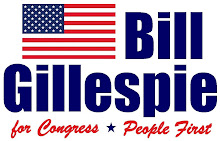 (Photo: Waldo Jaquith, CC license) |
"Why do you think we have 13 (military) bases in the state of Georgia?" Kingston said in an interview. "That doesn't happen by accident."Hm, well, that sounds plausible; who in GA-01, with its four major military bases, would object to that? And earmarks in themselves aren't the problem: they only account for less than 1% of the federal budget.
But when you dig deeper a different picture emerges:
Nearly one-fifth of the $552,000 war chest U.S. Rep. Jack Kingston collected in his 2008 re-election bid came from intended recipients of earmarks he requested this fiscal year or their hired lobbyists, campaign finance reports show.How many earmarks are we talking about?
The eight-term Republican congressman from Savannah requested $100.2 million worth of earmarks - funds inserted into federal appropriation bills for specific purposes - either solo or jointly with other lawmakers in 2008 spending bills. That's the 13th highest total among the 435 U.S. House members.Indeed most of it goes somehow to various military installations.
Still, the coincidences mount:
Kingston was appointed to the House appropriations subcommittee on defense in 2005, and campaign contributions from defense contractors soon came pouring in.How much came from intended earmark recipients? $101,600 according to the Federal Election Commission.
By the end of his 2006 election cycle, Kingston had collected $1.1 million - the most in any of his campaigns for public office. Defense contractors and their hired lobbyists also emerged as his top contributors.
Those same groups are among the largest donors to his 2008 campaign.
Nearly one-third of that money came from big defense contractors - L-3 Communications, Northrop Grumman and BAE Systems - and their lobbyists.Helping out local military bases that constituents want is one thing. Earmarking funds for companies that contribute to Kingston's campaign provides the appearance of something else.
The congressman earmarked a combined $7.2 million in U.S. Department of Defense projects for those three firms, or their subsidiaries, this fiscal year.
There's a lot more in Mike Perry's June 8 Savannah Morning News article.
See also the 11 Jan 2008 CBS News story about the FBI investigating a military contractor called ProLogic for its use of some public funds, and Kingston's role in providing earmarks for ProLogic. Kingston is on the list of political contributions ProLogic provided CBS News.
So if none of this is a problem, why is Kingston now proposing earmark reform, in a bill (HR 967) introduced 7 Feb 2008, shortly after the CBS News ProLogic story?
Maybe he was for earmarks before he was against them.




No comments:
Post a Comment